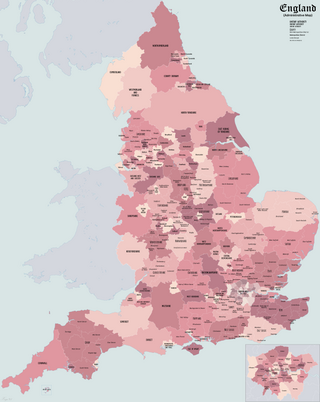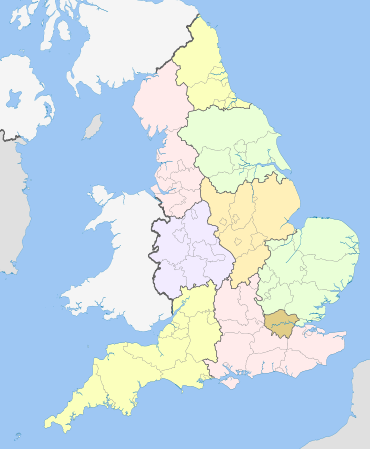
Metropolitan counties are a type of county-level administrative division of England. There are six metropolitan counties, which each cover large urban areas, with populations between 1 and 3 million. They were created in 1974 and are each divided into several metropolitan districts or boroughs. Following the abolition of metropolitan county councils in 1986, metropolitan counties no longer form a part of local government in England. Most of their functions were devolved to the metropolitan boroughs, making the boroughs effectively unitary authorities; any remaining functions were taken over by joint boards.

The subdivisions of England constitute a hierarchy of administrative divisions and non-administrative ceremonial areas.

Politics of England forms the major part of the wider politics of the United Kingdom, with England being more populous than all the other countries of the United Kingdom put together. As England is also by far the largest in terms of area and GDP, its relationship to the UK is somewhat different from that of Scotland, Wales or Northern Ireland. The English capital London is also the capital of the UK, and English is the dominant language of the UK. Dicey and Morris (p26) list the separate states in the British Islands. "England, Scotland, Northern Ireland, the Isle of Man, Jersey, Guernsey, Alderney, and Sark.... is a separate country in the sense of the conflict of laws, though not one of them is a State known to public international law." But this may be varied by statute.

The North East England devolution referendum was an all postal ballot referendum that took place on 4 November 2004 throughout North East England on whether or not to establish an elected assembly for the region. Devolution referendums in the regions of Northern England were initially proposed under provisions of the Regional Assemblies (Preparations) Act 2003. Initially, three referendums were planned, but only one took place. The votes concerned the question of devolving limited political powers from the UK Parliament to elected regional assemblies in North East England, North West England and Yorkshire and the Humber respectively. Each were initially planned to be held on 4 November 2004, but on 22 July 2004 the planned referendums in North West England and in Yorkshire and the Humber were postponed, due to concerns raised about the use of postal ballots, but the referendum in North East England was allowed to continue, particularly as it was assumed that the region held the most support for the proposed devolution.

In the United Kingdom, regional development agencies (RDAs) were nine non-departmental public bodies established for the purpose of development, primarily economic, of England's Government Office regions between 1998 and 2010. There was one RDA for each of the NUTS level 1 regions of England. Similar activities were carried out in Wales by the Welsh Government Department of Economy and Transport, in Northern Ireland by the Department of Enterprise, Trade and Investment and in Scotland by Scottish Enterprise and Highlands and Islands Enterprise.

Metropolitan and non-metropolitan counties are one of the four levels of subdivisions of England used for the purposes of local government outside Greater London and the Isles of Scilly. As originally constituted, the metropolitan and non-metropolitan counties each consisted of multiple districts, had a county council and were also the counties for the purposes of Lieutenancies. Later changes in legislation during the 1980s and 1990s have resulted in counties with no county council and 'unitary authority' counties with no districts. Counties for the purposes of Lieutenancies are now defined separately, based on the metropolitan and non-metropolitan counties.
The regional arts boards were English regional subdivisions of the Arts Council of Great Britain
A Cornish Assembly is a proposed devolved law-making assembly for Cornwall along the lines of the Scottish Parliament, the Senedd and the Northern Ireland Assembly in the United Kingdom.
Regional Assemblies in Ireland took their current form in 2015. They were established under the Local Government Act 1991, as amended by the Local Government Reform Act 2014. They have two main functions under this statute: to promote the co-ordination of public service provision and to monitor the delivery of European Structural and Investment Funds in the regions.

The North West Regional Assembly (NWRA) was the regional chamber for the North West England region of the England. It was based at Wigan, in Greater Manchester. It was abolished in July 2008.

The East of England Regional Assembly was the regional chamber for the East of England region of the England. It was based at Flempton, near Bury St Edmunds in Suffolk. The assembly was created as a voluntary regional chamber in 1998 by the Regional Development Agencies Act 1998. The first meeting was held in March 1999. In July 2003 the assembly was reconstituted to combine its existing functions with those of the regional arm of the Local Government Association and of the Regional Employers Organisation. The assembly was abolished on 31 March 2010, its functions transferring to the newly constituted East of England Local Government Association.

The South West Regional Assembly (SWRA) was the regional chamber for South West England, established in 1999. It was wound up in December 2008. Its functions were taken on by the Strategic Leaders' Board, the executive arm of the newly established South West Councils.
The Royal Commission on the Constitution, also referred to as the Kilbrandon Commission or Kilbrandon Report, was a long-running royal commission set up by Harold Wilson's Labour government to examine the structures of the constitution of the United Kingdom and the British Islands and the government of its constituent countries, and to consider whether any changes should be made to those structures. It was started under Lord Crowther on 15 April 1969, Lord Kilbrandon took over in 1972, and it finally reported on 31 October 1973.

Cornish nationalism is a cultural, political and social movement that seeks the recognition of Cornwall – the south-westernmost part of the island of Great Britain – as a nation distinct from England. It is usually based on three general arguments:
In England, spatial planning is undertaken at the national level, through the National Planning Policy Framework. The London region is the only one to have a statutory London Plan. Most planning functions are exercised by local authorities, with neighbourhood planning also taking place in some areas.

Local authority leaders' boards are voluntary regional associations of council leaders that have been established in England outside of Greater London to replace certain functions of the now abolished regional chambers. The establishment of the boards was part of the UK Government's Review of Sub-National Economic Development and Regeneration. which brought forward the Government's plans to alter the structure of regional governance in England and was mandated by the Local Democracy, Economic Development and Construction Act 2009. In June 2010, the new Conservative-LibDem coalition government announced plans to remove funding from the new boards and to remove their statutory functions. It was indicated that the boards might continue as voluntary associations of council leaders.

The regions, formerly known as the government office regions, are the highest tier of sub-national division in England, established in 1994. Between 1994 and 2011, nine regions had officially devolved functions within government. While they no longer fulfil this role, they continue to be used for statistical and some administrative purposes. While the UK was a member of the European Union, they defined areas (constituencies) for the purposes of elections to the European Parliament. Eurostat also used them to demarcate first level Nomenclature of Territorial Units for Statistics (NUTS) regions within the European Union, which in 2021 were superseded by International Territorial Level (ITL) regions. The regions generally follow the boundaries of the former standard regions, established in the 1940s for statistical purposes.

In England, regional ministers were appointed from 2007 on a part-time basis as part of Her Majesty's Government. Each minister had other departmental responsibilities, as well as specific responsibilities for one of the English regions. Their stated role was "to provide a clear sense of strategic direction for the nine English regions and to help strengthen their links with central government."

The Localism Act 2011 is an Act of Parliament that changes the powers of local government in England. The aim of the act is to facilitate the devolution of decision-making powers from central government control to individuals and communities. The measures affected by the Act include an increase in the number of elected mayors, referendums and the "Local authority’s general power of competence" which states "A local authority has power to do anything that individuals generally may do".

In the United Kingdom, devolution is the Parliament of the United Kingdom's statutory granting of a greater level of self-government to the Scottish Parliament, the Senedd, the Northern Ireland Assembly and the London Assembly and to their associated executive bodies the Scottish Government, the Welsh Government, the Northern Ireland Executive and in England, the Greater London Authority and combined authorities.














